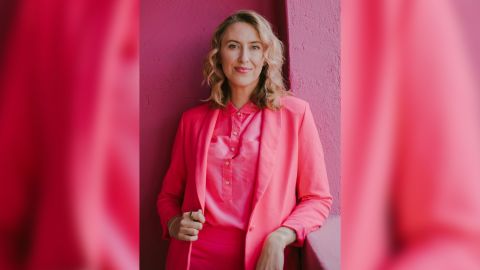Stop trying to fix yourself, this expert says
Straight away, Nora McInerny noticed core differences in how people responded to the coronavirus pandemic.
For some, the deadly virus and its upheaval constituted the “first big thing they’d ever been through.” Meanwhile, McInerny and others whose lives had been shaped by grief, loss or tragedy had long known that “life is fragile and our pace in this modern world is untenable.”
McInerny’s first husband, Aaron, died three days before Thanksgiving 2014, leaving her to raise their son, Ralphie. She’d just had a miscarriage. She had lost her father less than one month earlier.
Her work — as host of the podcast “Terrible, Thanks for Asking” and author of “It’s Okay to Laugh (Crying Is Cool Too)” and “No Happy Endings,” among other memoirs — reflects those losses, countering the societal pressures to “live, laugh and love” with candor, realism and wry humor.
Her new essay collection, “Bad Vibes Only: (And Other Things I Bring to the Table),” offers a cutting and comedic retort to “our aggressively, oppressively optimistic culture” and “obsession with self-improvement.”
The slogan “Good Vibes Only” makes “a cute saying for a mug but a pretty ominous interpersonal standard,” McInerny wrote.
Here, she suggests honesty and underachievement as goals better suited to reality.
This conversation has been edited and condensed for clarity.
CNN: What do you hope people will take away from your work?
Nora McInerny: I want my work to lower the bar for people. We have so much intense pressure to achieve and to perform in the face of all the suffering and struggle of modern life. You do not have to do anything other than just be a decent person and survive.

The year 2021 was the worst year of my life since 2014, when my husband, Aaron, died. This horrible illness went sweeping across our globe and immediately people started to “bright side” it. I remember sitting in my living room cross-legged, trying to figure out how we could do more work with fewer resources. Meanwhile, people were trying to shine it up and alchemize it into some sort of self-improvement lesson. I resist that. All my work has been sort of pushing against the optimist industrial complex.
CNN: How does perfectionism tie into this kind of optimism?
McInerny: The gifted-child-to-overachieving-professional-female pipeline is filled with perfectionists. What is a perfectionist if not just a person who hates themselves — who cannot just enjoy the act of being alive?
From the moment Aaron died, I felt like I had to be earning my place on this planet — just doing, doing, doing. I had to figure out how to perform being a worthy person. When a therapist asked me who I would be without all my jobs and titles, I stared at him blankly.
The book is about existing in the contradictions of modern life. There’s almost no way to opt out of the fire hose of viewing other people’s lives that stirs up deep insecurity and anxiety about our own. Every single person in my life — except the few who do not have social media — are starring in, producing and directing their own reality show for the consumption of mostly strangers, including myself. What a strange world.

CNN: You write, “Every beleaguered and exhausted millennial I know fantasizes about a life connected to something bigger than Wi-Fi … aching for a bit of quiet in a world that is constantly screaming at us from little rectangles in our pockets.” Where do you get that connection?
McInerny: What has helped me are honesty and other people’s stories, which remind me I’m not alone.
I will say that most in the self-help industry are grifters selling millions of books by hawking the dream that you, too, can do the same when the vast majority of people cannot. There is something to be said for just being realistic. People trying to sell you on “do these five quick steps and everything will be fine” are scammers. Saying “the answer is inside of you” sets the trap that if you can’t find the answer, you must be defective.

I’m not talking about qualified mental health professionals and researchers, here. If they tell you to eat mindfully and go outside and look at the grass for five minutes, do it. Sitting here, petting my dog and not scrolling helps me. Putting my phone down has helped me, as I’m sure it would most of us.
Every generation believes that it has never been worse. But all this dread and existential ennui is a very normal response to an unfeeling world where billionaires are trying to vacate this planet via rocket ship and we’re fighting for scraps. Why wouldn’t you be anxious?
CNN: What advice do you have for people struggling against the tide of an optimism that feels forced or fake?
McInerny: First, “Cs get degrees.” I started saying this during the pandemic, but it took me a long time to believe it for myself. Do your not-best. The need to give your absolute best in every situation is a lie sold to you by a gym teacher, a coach and capitalism. No, you do not owe everything 110%. You actually owe most things a 70, maybe even a 60. The world does not require your perfection.
The second is, you are not required to be an open book. Not everybody deserves the full truth, but you’ve got to find at least one person you can tell the whole story to — one person who knows what it’s like.
This book is a collection of essays. Readers are not going to come away with five tips or tricks. There are no tips. There are no tricks — just the very messy business of trying to be a person in a really difficult world.


